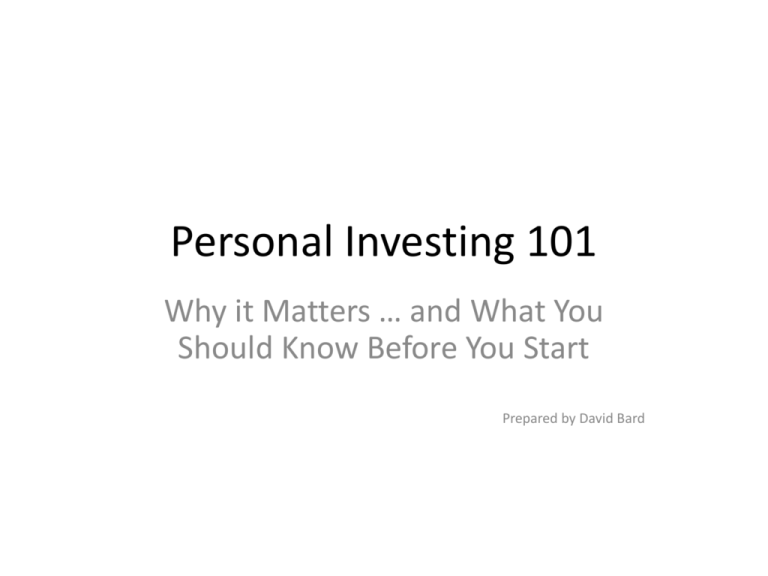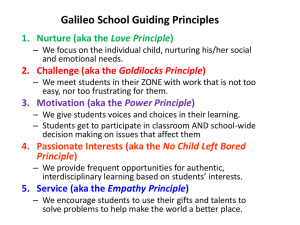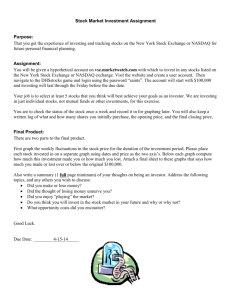Investing 101
advertisement

Personal Investing 101 Why it Matters … and What You Should Know Before You Start Prepared by David Bard What is Investing? • There are two ways to make money: − Working work hard to earn wages (aka income) − Investing Apply your saved wages (aka savings or capital) to ‘work’ for you • Investing generates wealth over time by committing money (aka capital) to an endeavor with the expectation of obtaining an additional profit − Put differently, investing is putting your money to work by taking on measured risk to generate returns (aka profit) − Investing is NOT get-rich-quick scheme or gambling gambling is putting your money at risk by betting on an uncertain outcome • We invest in order to generate returns on our savings for use when we are older and no longer working notably, we are becoming increasingly responsible for our own retirement (social security is expected to go bankrupt in 2024…) How investing generates returns • When you invest, your capital (aka savings) earns ‘returns’ (aka profit) over time in one of several ways: – Cash payments e.g., you own a bond which pays ‘coupons’ (aka interest) every 6 months worth 4% of the capital you invested – Capital appreciation e.g., you own a stock which increases in value from $20/share to $25/share over a year (didn’t pay you cash, but you could sell for more than you bought) • Fundamentally, your capital is getting paid for providing one or more of the following three things: – Time the longer you invest, the more you should earn – Liquidity the less access to your money you need (i.e., you are not able to get your money back for a longer period of time), the more you should earn – Risk the more risk you are willing to take the more you should earn How the Math Works • • • • Let’s say you earn 6% on $10,000 $10,600 in a year – You earn 6% because you are NOT using your capital for something else (liquidity) over a year (time) and taking on some chance of not getting paid back (risk) Compounding: Albert Einstein called compounding "the greatest mathematical discovery of all time" – You generate earnings on prior earnings – In prior example, $10,600 becomes worth $11,236 by end of Yr 2 the extra $600 from Yr1 generates another $36 in Yr2! Starting early matters: – Jim took $10,000 and invested at age 25 and it’s now worth $42,919 – Tim waited until he was 35 to start investing and it’s now only worth $23,966 $20K difference! Note that prices around you will rise over time (aka inflation) so if you don’t invest, you ‘fall behind’ $50,000 $45,000 $40,000 $35,000 $30,000 $25,000 $20,000 $15,000 $10,000 $5,000 Jim Tim $0 25 27 29 31 33 35 37 39 41 43 45 47 49 To be ‘Successful’, Know Yourself… • It’s important to know your investment objectives from the outset and consider how they change over time • Your objectives can be influenced by several factors: – Age: a 75yr old widow will want to make sure he doesn’t lose his investment while a 25yr old can take some risk – Life Stage/Position: a 30yr old who will need capital to invest in a home and pay for children will want more liquid investments – Need for Income: you might have a regular need for cash (e.g., family member obligation) which means you will want investment that pays regular cash amounts – Preferences: you may have more or less desire to take on risk (aka ‘risk aversion) • Rule of thumb: If you have a shorter time horizon you should use a more conservative investment approach • Putting it all together you need to figure out your balance of time, risk (tolerance) and liquidity It’s Not Simply or Easy • • • Physics and chemistry are hard sciences – There are rules that the world follows about how things work – E.g., gravity causes all objects to fall a certain way and with a certain acceleration Economics and finance are soft sciences – On average, over time, they will work a certain way – BUT for a short period of time, anything can happen and risky assets can do well and less risky ones can do poorly The markets won’t make sense all the time and your investments will make and lose money in the short-term in ways you didn’t expect – Always try to invest across time / consistently, so that you don’t end up putting too much money into the market at a disadvantageous time Types of Investments Types of Assets • • • • Debt (aka fixed-income) – Lending out your money to others? (opposite of a mortgage) – Range from highly safe (US gov’t) to highly risky Equity (aka stocks) – Buying part ownership in a business buying right to small portion of the cash flows of the business (e.g., Dividends) and have rights (e.g., info, voting) – Often volatile and may not pay out much only earning ‘residual’ value – Range from value to growth Real Estate (also has debt and equity) house/apt to RE funds Currency, commodities complicated Vehicles • • • • • Company securities (e.g., stocks, bonds) Mutual Funds – Collection of securities – Pay a 3rd party to pick group of stocks with certain properties Exchange Traded Funds – Same as mutual fund but not a person, just a pre-set ‘index’ – Has ‘ticker’ just like a stock Home – Your house / apartment is effectively a real estate investment – Key difference is (a) concentration and (b) mortgage (money borrowed from a bank which amplifies risk) Variety of others… Portfolio & Benefits of Diversification • • The cornerstone of investing is putting these assets together into a ‘portfolio’ – A portfolio is a combination of assets that have certain characteristics which meet your investment objectives – On the right, you see a portfolio that is ‘Conservative’ (has very little exposure to higher risk equity assets) and ‘Aggressive’ (the opposite) By creating a portfolio, you get the benefit of diversification – A mix of assets is unlikely all over / underperform at the same time (note that a house / apartment is ‘one basket’) – This is similar to the old saying ‘don’t put all your eggs in one basket’ Do You Need an Investment Advisor? • • • • • • An investment advisor can help you navigate the above options, but come with a cost – Financial advisors (aka planners) often serve as investment advisors and help you map out a financial gameplan (e.g., how much to save, when to save, when to invest) Much like any service you buy (e.g., lawn mowing, haircuts), it’s a tradeoff between your time / effort and your money If you decide to hire an advisor, be sure to ask for and verify his credentials – e.g., a CFP or PFS designation for financial advisor and a CFA for an investment advisor Here are some key questions to ask when hiring an advisor: – Relevant experience: What experience do you have, especially with people in my circumstances? – Qualified Background: Where did you go to school? What is your recent employment history? What licenses do you hold? Are you registered with the SEC, a state, or FINRA? For registered investment advisers, will you send me a copy of both parts of your Form ADV? – Offering: What products and services do you offer? – Compensation: How are you paid for your services? What is your hourly rate, fee, or commission? – Past Issues: Have you ever been disciplined by any government regulator for unethical or improper conduct or been sued by a client who was not happy with the work you did? Consider recommendations from others but make sure that he / she fits your needs and profile Useful gov’t resource: https://www.sec.gov/investor/pubs/invadvisers.htm Q&A • Any questions?


